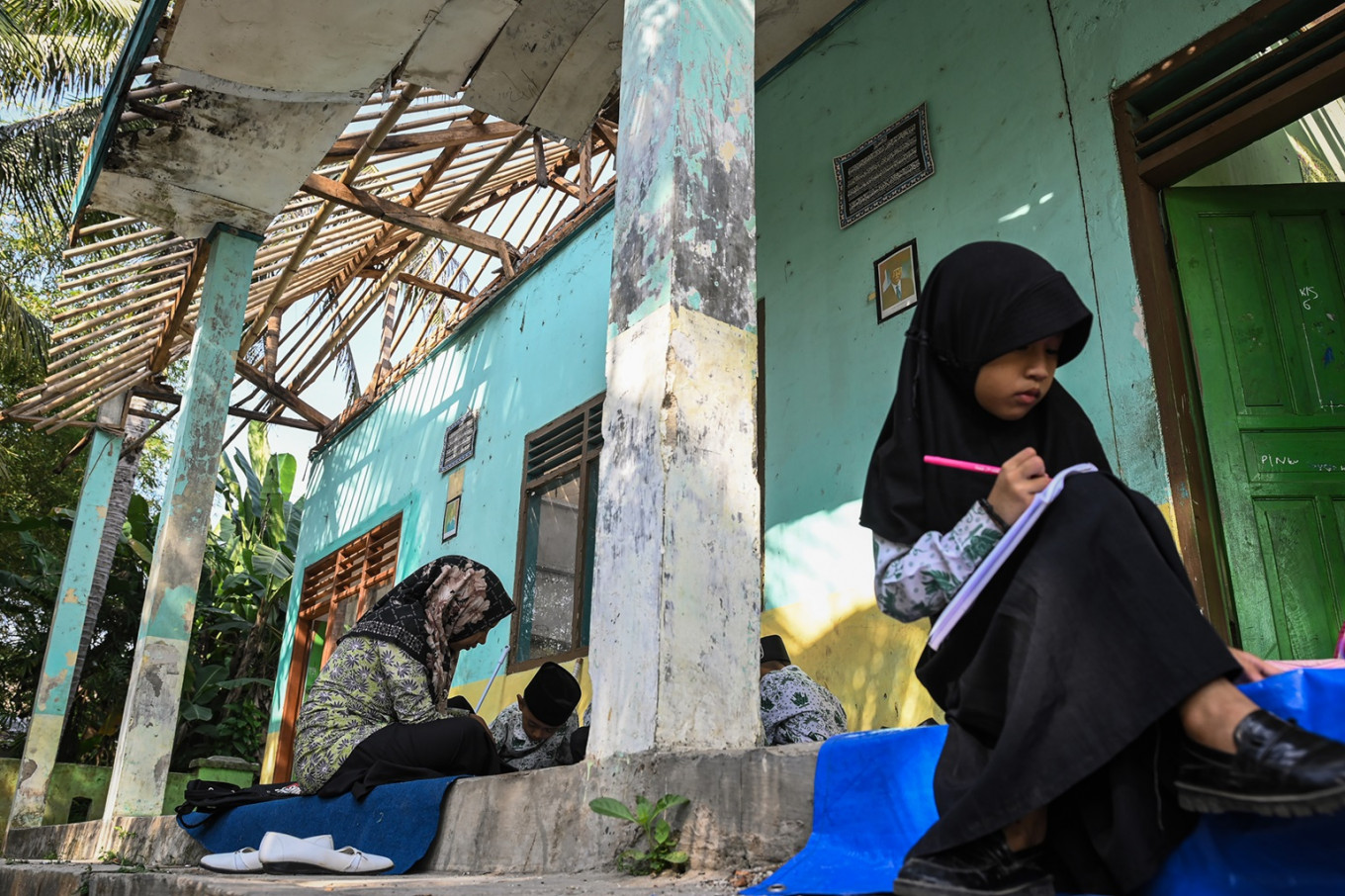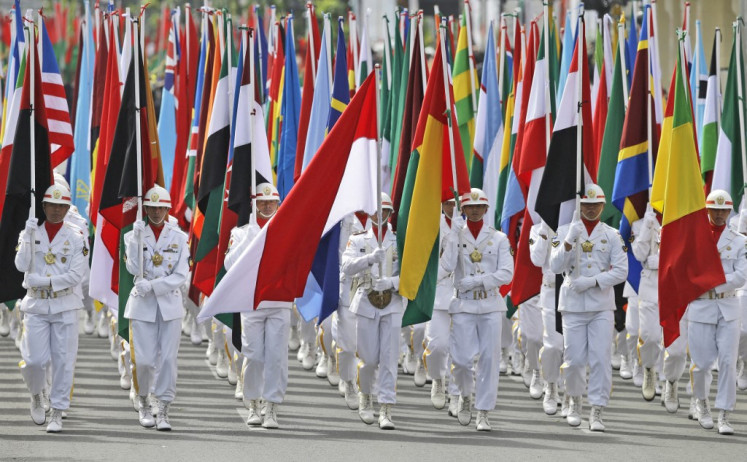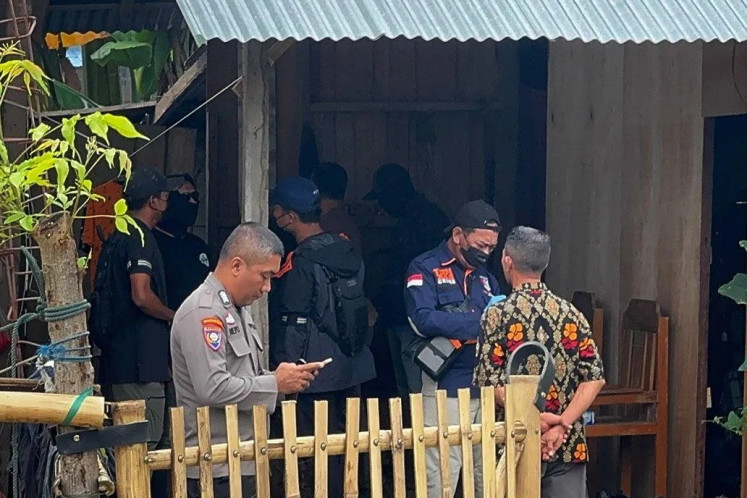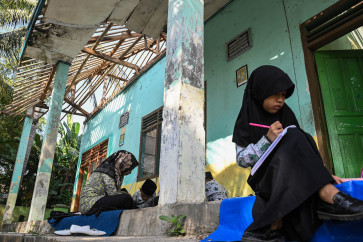Popular Reads
Top Results
Can't find what you're looking for?
View all search resultsPopular Reads
Top Results
Can't find what you're looking for?
View all search resultsThe mirage of progress: Scrutinizing the push for IB schools
The establishment of IB schools in Indonesia could be seen as exacerbating the pre-existing educational divide, turning it into a chasm between the haves and have-nots.
Change text size
Gift Premium Articles
to Anyone
 A student studies in the terrace of a heavily damaged building of MIS Al-Khaeriyah private Muslim elementary school in Tangerang regency, Banten on Aug. 22, 2024. The school resumed its activities in its yard and local residents' houses as the school building is heavily damaged and requires renovation. (Antara/Sulthony Hasanuddin)
A student studies in the terrace of a heavily damaged building of MIS Al-Khaeriyah private Muslim elementary school in Tangerang regency, Banten on Aug. 22, 2024. The school resumed its activities in its yard and local residents' houses as the school building is heavily damaged and requires renovation. (Antara/Sulthony Hasanuddin)
T
he government's decision to introduce 20 International Baccalaureate (IB) schools under the National Medium-Term Development Plan (RPJMN) is framed as an advancement toward a globally competitive educational system. By being too elite-centric, this reform undermines efforts to reduce educational disparity between the poor and the rich, ultimately aiming for vague, unclear goals.
The establishment of IB schools in Indonesia could be seen as exacerbating the pre-existing educational divide, turning it into a chasm between the haves and have-nots. These schools, with their stringent admission criteria, cater almost exclusively to students from privileged backgrounds, who have the resources to achieve the necessary accolades for entry. The IB schools that recently signed a contract with the Higher Education, Science and Technology Ministry will only admit students with proven national or international achievements.
However, nationally, high-achieving students are more likely to come from wealthier families. For instance, students who achieved at least minimum proficiency in the 2022 Programme for International Student Assessment (PISA) results were disproportionately from wealthier backgrounds. Specifically, 45 percent of wealthy students versus 15 percent of poorer students reached proficiency in reading, and 36 percent of the wealthy versus 9 percent of the poor reached proficiency in mathematics. In other words, the strict admission criteria of such schools will be much more likely to be fulfilled by the richest students in the country.
“If you struggle, you can achieve anything you want despite all odds.” This fairy tale-like motivational statement, however, is at odds with the data. How can anyone expect a child to become a high achiever if they cannot even access education? Data from Statistics Indonesia show that in 2024, the richest individuals have an average of 11.5 years of schooling, while the poorest only have 7.4 years. In other words, wealthy students are already graduating from senior high school, while many impoverished students cannot even continue their education beyond junior high. While this elitist approach might be defended with beautiful, yet unrealistic, statements, it fails to address the harsh realities of inequality in education.
Philosophically, this scenario challenges the egalitarian ethos of education, which, according to thinkers like John Dewey, should serve as an instrument of democracy and social equality, not a mechanism for perpetuating or even worsening social hierarchies. While there is no opposition to IB schools in general, it is problematic to use taxpayers' money to discriminately benefit those who do not need assistance.
The allocation of potentially vast sums of public funds toward these elite institutions rather than addressing the basic educational needs in underprivileged areas points to a critical misplacement of priorities. This approach not only widens the educational gap but also raises ethical questions about the equitable distribution of educational resources. If education is to be a tool for social mobility and empowerment, as Paulo Freire would argue, then the current policy seems misaligned with these philosophical ideals, focusing on excellence for the few at the expense of basic education for the many.
The financial commitment to IB schools, which could amount to substantial public funds, thus appears misaligned when compared with the pressing need for basic educational infrastructure in remote, underserved areas. While the RPJMN does include initiatives aimed at revitalizing school facilities, the focus on elite education through IB schools does little to address the foundational issues plaguing educational access and quality for the majority.


















